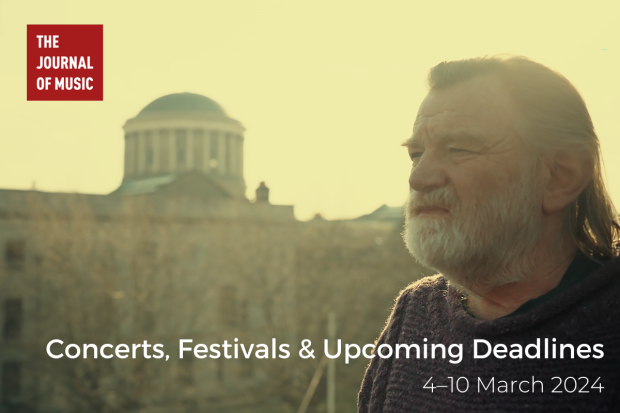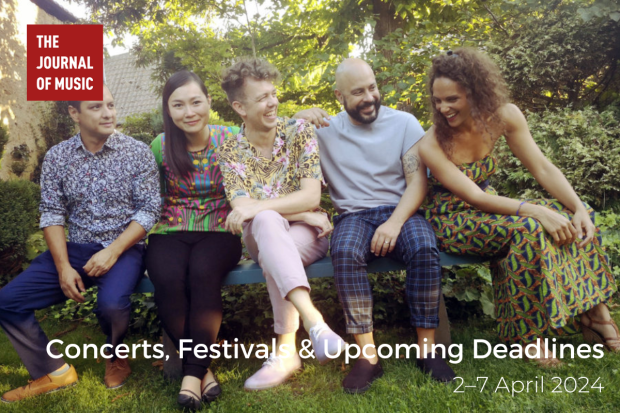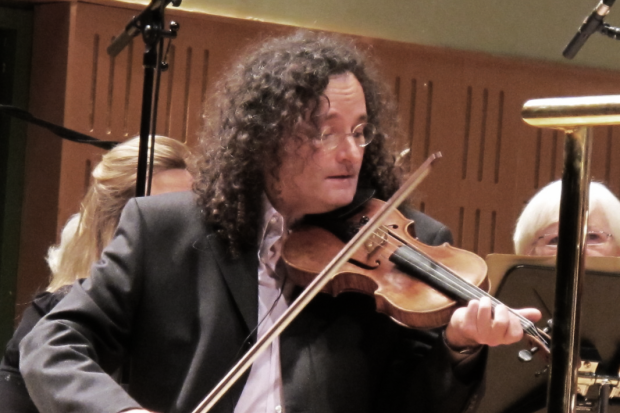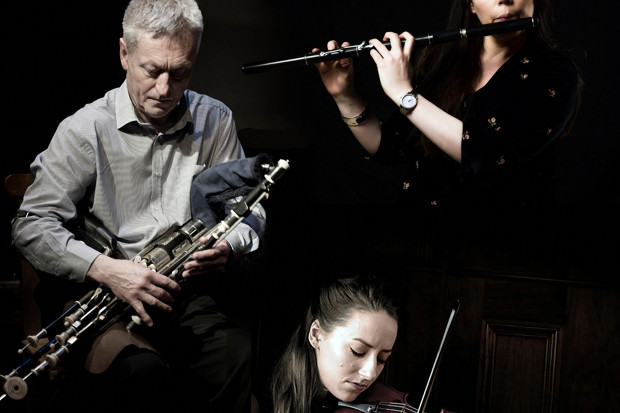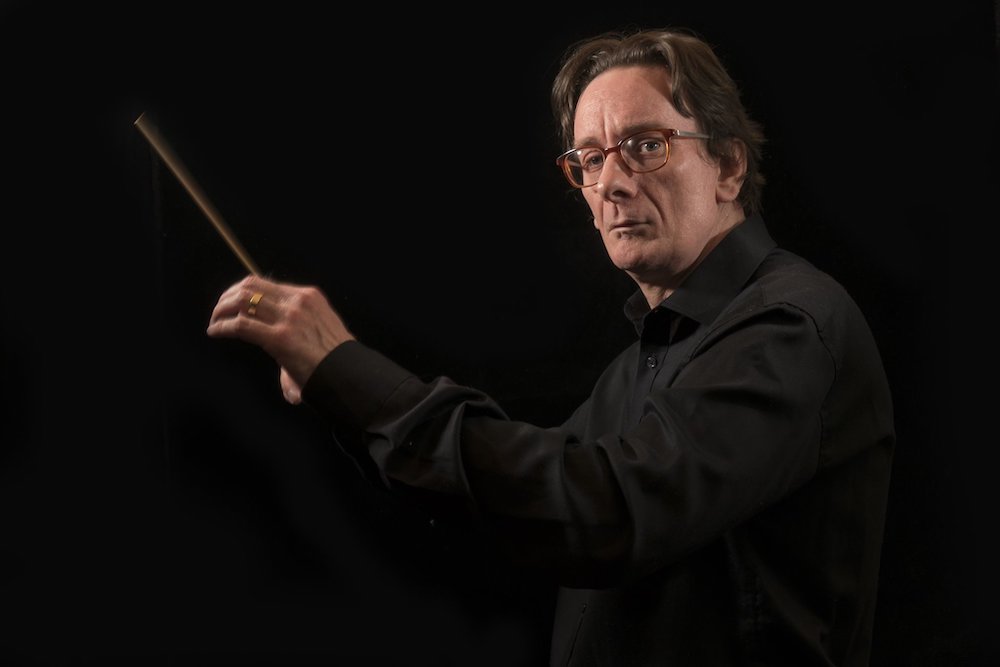
Dave Flynn
Hear Him Out
Dave Flynn has many hats. He is well known as an excellent guitarist of traditional Irish music with various albums in this capacity. He plays contemporary music on guitar too: he co-founded the Dublin Guitar Quartet, and released a solo album of original compositions, Winter Variations, in 2014. He is also the founder and artistic director of the Irish Memory Orchestra, and released an album with them last year (Live in Ennis 2012, Frisbee). But he might be best known as a composer, and in particular one who has long taken a serious interest in finding a deep rapport between Irish traditional and classical music. This album consists of some of his attempts to demonstrate the affinities he sees between the traditions.
If you think that any such fusion would inevitably be dilettante-ish for one or other of these musics, then I would say hear Flynn out. The album starts with intent: The Cranning (2004–05; Flynn’s second string quartet), opens with a slip jig, and though the pulse is frequently upset, there is lively movement here, and it is immediately apparent that Flynn has a gift for combining a strong feel for dance with rhythmic mercuriality – or of finding the balance between the different ways in which classical music and Irish traditional music incorporate dance and groove. This balance is not always maintained: in the fourth movement, for example, the aggressive ostinato figure, which owes its driving energy to traditional music, is overbearing in the context of a string quartet. But the work is mostly successful.
The Keening (2007), Flynn’s third quartet, is, as the title suggests, an entirely different creature. Its three movements are entitled (in Irish) ‘murmuring’, ‘dirge’, and ‘cry.’ It is a remarkable work, with powerful use of slow portamenti, the upper registers of the violins, and, in the second movement especially, microtones that strongly connect the quartet to sean-nós singing. It is a less ostentatious work than The Cranning, but it is subtler, and it has stuck with me strongly.
The ConTempo Quartet performs both these quartets wonderfully. They play The Cranning with compelling vigour, but especially affecting is how they bring out the oh-too-human wails and sobs in The Keening – I suspect that it would be easy to interpret this score in a way that lost the music’s connection with this source.
Between these quartets lies The Cutting (2008), a quintet for string quartet and uilleann pipes. The ensemble writing for this unusual combination of instruments is mostly excellent, and if the quartet seems sometimes to be playing more of a supporting role than to be equal partners, there is yet never a whiff of gimmick about the writing. There are some lovely musical ideas throughout, too: I was especially entranced by the accompanying figures in the middle of the second movement. However, The Cutting as a whole sounds more like an experiment in the timbral blending of uilleann pipes and strings, and as a work of music it doesn’t particularly leave a mark. Mick O’Brien (on pipes) and the IMO Quartet, for their part, do great justice to both the Irish traditional and classical aspects of the music.
The album closes with another light piece: Stories from the Old World (2008) for string quartet, uilleann pipes, and narrator/sean-nós singer. Breanndán Begley, supported by O’Brien and the IMO Quartet, recounts four short tales (one of them sung) as they were told by Peig Sayers. (The stories are all in Irish, but there is a loose translation in the liner notes.) Begley is an engaging storyteller, and this is a charming setting of these four stories.
Irish Minimalism documents music from a short, and well past, window of time: 2004–08. Even the recordings are from 2012, according to the liner notes. This is a bit odd: Flynn is still composing Irish-influenced classical music (see, for instance, Shadowplay (Frisbee, 2016) and the IMO’s Soundcloud), and even wrote a second uilleann pipes quintet, Calmly Awaiting the End, in 2016. Perhaps the explanation here lies in the fact that Irish Minimalism is actually mostly a re-release, on First Hand Records in the UK, of his Stories from the Old World (Frisbee, 2019): apart from the addition of The Cutting, it is the same recordings of the same pieces. That earlier recording went under the radar, though: it is not on any streaming services. Perhaps the composer felt these pieces deserved better marketing than they’d gotten (Frisbee Records, as far as I can see, is just how Flynn self-releases music).
Marketing might also explain the puzzling title of this new album. There’s plenty of Irish in Irish Minimalism, but unlike in other music by Flynn (as in Dún Laoghaire Harbour (2020)), I hear hardly any minimalism, certainly not of the Reich/Glass US tradition. To be sure, there’s repetition and there are drones, but each exists natively in the Irish musical forms on which Flynn draws, and don’t feel ‘minimalist’ in any more general sense either, barring a few passing moments (such as the end of ‘Old Hags’ from Stories from the Old World). If there’s any composer to whom I would compare Flynn’s works on this record, it would be Bartók in his folklorist mode. (Indeed, Flynn himself drew this comparison in an article in the Journal of Music that was written at a similar time to the pieces on this album.) But mostly the music is charting its own course. And it is stronger for it – I just wish Flynn had not titled the album as if it were genre music when he’s doing something far more individual.
But this is a quibble that I mention only to warn readers against being put off by the cover. This is a serious and interesting album that does a remarkable job of incorporating Irish musical ideas into string quartet writing without any hint of awkwardness or staidness, and without the depths of subtlety of either musical tradition being compromised.
Purchase Irish Minimalism by Dave Flynn from First Hand Records or Bandcamp.
Published on 21 October 2021
James Camien McGuiggan studied music in Maynooth University and has a PhD in the philosophy of art from the University of Southampton. He is currently an independent scholar.










